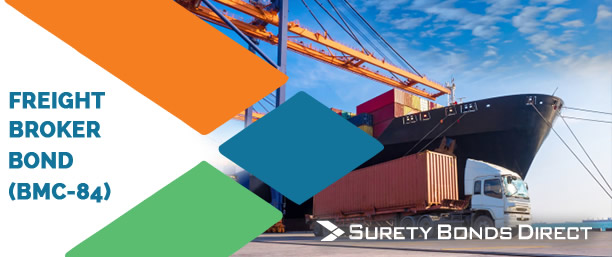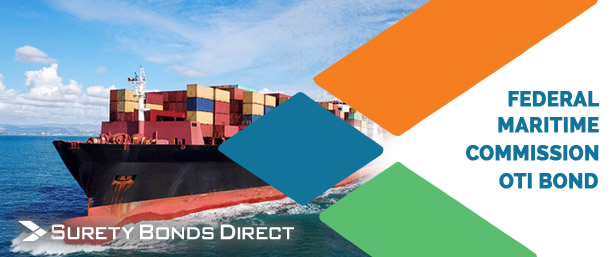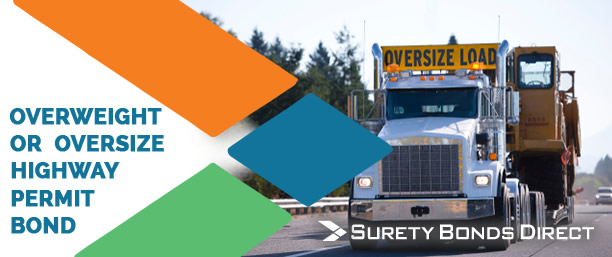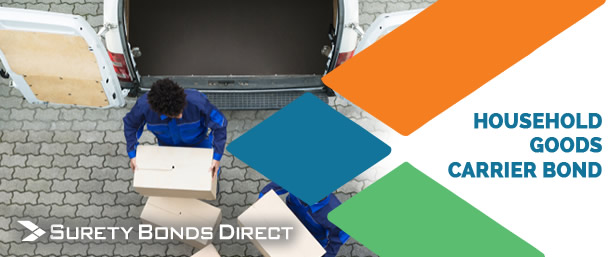4 Bonds Required to Ship Goods
Review 4 bonds for different types of freight, including what they are, how much you can expect to pay for them, and some of the other licensing processes.

Shipping any kind of goods means taking on a lot of responsibility. Once the product hits the road, it's your job to maintain compliance, prioritize safety and get the client's goods to their destination. One way of guaranteeing that you'll honor that responsibility is to purchase a surety bond. In fact, in most transportation sectors, it's required by federal and/or state government regulations.
Surety Bonds Direct offers numerous different bonds that help businesses, governments and customers work together to ensure that transportation is safe and ethical. We're proud to help our logistics and transportation customers by offering great rates on the bonds that are necessary to stay in compliance. In this article, we'll take a look at four bonds that are essential for different types of freight, including what they are, how much you can expect to pay for them and some of the other licensing processes that accompany them.
The Surety Bonding Process
Most of the bonds listed here are obtained through similar processes, and they're all available online from Surety Bonds Direct. You'll use our free quote request form to enter your business's basic information. We'll use our extensive surety network and our sophisticated software to match you with reliable sureties and search for the most affordable rate. If you're happy with the rate, we'll get the ball rolling and complete all of the relevant paperwork for you. Remember that we can work with you even if you have imperfect credit, and that we have options available for lowering your premiums like financing plans and co-signers.
With that in mind, let's jump into the world of freight bonds with one of the most common types: the BMC-84 freight broker bond.

1. Freight Broker (BMC-84) Bond
Running a freight brokerage requires strict adherence to numerous laws, regulations and ethical standards. That's why, as part of the lengthy and involved process of getting a freight broker license, the Federal Motor Carrier Safety Administration (FMCSA) requires you to obtain a freight broker bond (also called a BMC-84, after the form used) to guarantee your compliance with these codes. (If you've heard someone refer to a property broker bond, transportation broker bond or ICC bond, these terms all refer to the same type of bond.)
Since the FMCSA's registration and certification process can be quite complex, it's worth running through a quick introduction to its requirements for registering new freight brokerages, motor carriers and other commercial freight operations. You should be familiar with the FMCSA regulations in full before you begin your business operations—but here's a brief guide to what you'll need to get started:
- Applying to register your business through the FMCSA's online system and getting a USDOT number and MC number.
- Obtaining any additional necessary permits such as a Hazardous Materials Safety Permit.
- Completing the New Entrant Safety Assurance Program to certify your knowledge of safety regulations.
- Obtaining the appropriate insurance and BMC-84 surety bond.
- Developing procedures for screening CDL drivers for drug use and background.
- Completing any additional steps required by your state or municipal government.


So, what should you expect for the process of getting a freight broker surety bond? First, understand that it will require some investment: Federal law requires that a freight broker's surety bond cover $75,000. However, as with most surety bonds, you'll pay a small percentage of this amount as an annual premium. Your credit score will be a big factor in determining the rate you pay for a BMC-84 bond, as sureties will want to see that you've demonstrated financial responsibility and the ability to meet your obligations. A BMC-84 can be especially attractive if you have strong credit, since a good credit score will significantly decrease your premiums.
Alternatively, you can also satisfy the FMCSA's bonding requirements by obtaining a BMC-85 trust fund agreement. In this arrangement, the principal posts the entire $75,000 in up-front collateral with a banking institution. The $75,000 will then be held and unavailable to you while you're license is in force. Either option is a valid choice for fulfilling your obligation. However, a BMC-85 has some notable disadvantages, the most important being that you have to post the entire bond at once, allocating valuable capital that could be put to better use elsewhere.
If you choose to go with a BMC-84 bond, Surety Bonds Direct has you covered through the process described above. Once the bond is approved, Surety Bonds Direct will file the necessary bond paperwork for you with the FMCSA at no additional charge. You'll then be ready to continue with the application process.
If your business model involves shipping via maritime freight rather than road freight, you'll probably need an OTI bond rather than a BMC bond. Read on to learn more about what they are and how to get one.
2. Federal Maritime Commission OTI and NVOCC Bonds
Those operating maritime freight brokerages will usually be required by the Federal Maritime Commission (FMC) to obtain an Ocean Transportation Intermediary (OTI) surety bond. These bonds are similar to most other surety bonds in that they guarantee a broker's compliance with relevant standards and provide recompense to partners and governments in the event of violations.


First, you'll need to establish whether your business is classified as an ocean freight forwarder (OFF) or non-vessel-operating common carrier (NVOCC). The differences between OFF and NVOCC are subtle, but the main difference is that an NVOCC leases space on other carriers' ships but acts as the carrier, while an OFF connects shippers with carriers but does not act as a carrier itself.
FMC regulations require different bond amounts for different types of OTIs. You can expect to pay the following at a minimum:
- $50,000 for OFFs.
- $75,000 for NVOCCs domiciled in the U.S.
- $150,000 for NVOCCs domiciled outside the U.S.
Since these bonds often cover complex international trade, the bond amounts may be higher for some carriers. For example, carriers who arrange freight transport between the U.S. and China will need to file an optional rider that raises the cost by $21,000 and satisfies financial obligations to the Chinese government.
Finally, you'll also need to go through the standard application process of becoming an OTI. That process will typically include:
- Getting the right insurance and surety bond(s).
- Registering with the FMC via the FMC-18 application form and paying the application fee.
- Naming and registering a qualifying individual as outlined in FMC standards.
- Establishing a branch office in the U.S. if your business is an NVOCC with a foreign headquarters.
3. Overweight or Oversize Highway Permit Bond
Oversize load hauling operations, such as structure relocations and transporting many types of heavy machinery, require special permits and strict attention to safety and regulations. Even when extra care is taken, however, they can cause damage to pavement, bridges and other road structures, necessitating costly repairs. An overweight or oversize highway permit bond helps ensure that you'll take appropriate caution in hauling your goods, and that the state will be quickly repaid in the event of damage. Thus, in many states, these bonds are required in order to get the oversize load license needed for these hauling jobs.


These bonds are also sometimes called "over axle" or "over gross weight" bonds because they refer to trucks hauling loads above the typical axle weight limits set by the Department of Transportation, which are as follows:
- A gross weight of 80,000 pounds.
- A single axle weight of 20,000 pounds.
- A tandem axle weight of 34,000 pounds.
In order to get a permit, you'll usually need to demonstrate that your load is considered nondivisible—i.e., that dividing it up to meet axle weight limits isn't feasible. Be prepared to demonstrate your argument for why your load is non divisible to your state licensing authority.
Your permit for an overweight or oversize load will be issued by your relevant state government rather than by the federal DOT, so you'll need to select the state you need on our database of state oversize freight laws. States have widely varying policies on overweight permit bonds. In some, for example, you won't need a credit check for bonds under a certain amount, while others always require one. The process for applying for an overweight permit also varies according to which state you're in. Also remember that for interstate trips, you may need a bond for each state that your load will travel through.
4. Household Goods Carrier Bond
In several states, including California, Virginia and Florida, household moving services are required to obtain household goods (HHG) carrier bonds. (Here, "household goods" means people's personal possessions, rather than factory shipments of new goods.) People who entrust freight services with their household goods are putting some of their most precious possessions into the hands of their freight carrier, so it's crucial that the carrier have a surety bond to guarantee that they'll fulfill their obligation to transport the goods safely.


Depending on your state of operations, HHG carrier bond amounts can be substantial. In Virginia, for example, the minimum bond amount is $50,000 and requires a credit check. In Florida, on the other hand, no credit check is required, and in California, HHG bonds are required only if your company does COD shipments or uses subcontractors. The best way to know which requirements apply to your state is to check our database of state household goods carrier bond requirements.
The processes to become a licensed HHG carrier also have significant differences between states, but carriers are subject to many of the same FMCSA regulations as other types of freight carriers. You'll need to obtain a DOT number, complete the New Entrant Safety Assurance Program, outline your procedures for screening drivers and file your application with the FMCSA.
Why Use Surety Bonds Direct for Your Broker and Carrier Bond Needs?
Surety Bonds Direct offers a faster, easier and less expensive way to get any bond you need to ship goods. We've seen that far too often, people pay high prices and get poor service from insurance companies that consider surety bonds a side business and contract with too many middleman brokers who take their own cuts. So we decided to do better:
- Our business is simple: We connect our clients with reputable surety providers rated "A" or better by AM Best Ratings Services. We're called Surety Bonds Direct because we create these connections directly, rather than operating through networks of intermediaries, and we save our customers money in doing so.
- We employ a staff of surety bond experts who can provide all of the guidance you need to get bonded quickly and easily and to be confident that you've chosen the right bond type.
- Surety Bonds Direct only sells surety bonds, unlike other companies that sell many different types of insurance. This allows us to stay laser-focused on cultivating the best networks of surety partners and creating great value for our customers.
- We work with a wide network of sureties to make sure that we provide the full range of options our customers need. Some of our surety partners specialize in providing services to principals with credit problems, meaning that you can often get an affordable rate even with bad credit or no credit.
- Our premium financing and co-signer options allow us to decrease premiums even further for many of our customers. We know that starting a freight business already comes with significant capital expenses, so we like to give our customers the maximum amount of options to create an optimal financial arrangement.

Setting up any kind of freight carrying operation is a complex and expensive proposition with many factors to consider. Don't make it harder by using an expensive and inefficient insurance company or brokerage. Surety Bonds Direct has the resources to make it a snap. We've secured surety bonds at great rates for many thousands of clients, and they love the results.
Do you need advice on what kind of freight bond you need, or how you can get it at an affordable rate? Do you have credit problems and need solutions for getting the right bond? Surety Bonds Direct has the answers! Call our experts at 1-800-608-9950 to connect with the solutions to your surety bond needs, or get started with a quick and easy quote on your surety bond.
 Jason O'Leary
Jason O'Leary
updated: